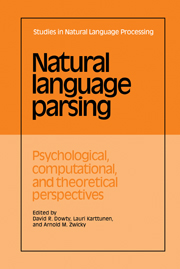
-
Select format
-
- Publisher:
- Cambridge University Press
- Publication date:
- January 2010
- May 1985
- ISBN:
- 9780511597855
- 9780521023108
- Dimensions:
- Weight & Pages:
- Dimensions:
- (228 x 152 mm)
- Weight & Pages:
- 0.636kg, 428 Pages
You may already have access via personal or institutional login
Book description
This is a collection of new papers by leading researchers on natural language parsing. In the past, the problem of how people parse the sentences they hear - determine the identity of the words in these sentences and group these words into larger units - has been addressed in very different ways by experimental psychologists, by theoretical linguists, and by researchers in artificial intelligence, with little apparent relationship among the solutions proposed by each group. However, because of important advances in all these disciplines, research on parsing in each of these fields now seems to have something significant to contribute to the others, as this volume demonstrates. The volume includes some papers applying the results of experimental psychological studies of parsing to linguistic theory, others which present computational models of parsing, and a mathematical linguistics paper on tree-adjoining grammars and parsing.
Contents
Metrics
Altmetric attention score
Full text views
Full text views help Loading metrics...
Loading metrics...
* Views captured on Cambridge Core between #date#. This data will be updated every 24 hours.
Usage data cannot currently be displayed.
Accessibility standard: Unknown
Why this information is here
This section outlines the accessibility features of this content - including support for screen readers, full keyboard navigation and high-contrast display options. This may not be relevant for you.
Accessibility Information
Accessibility compliance for the PDF of this book is currently unknown and may be updated in the future.


